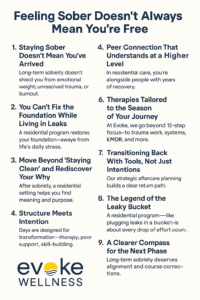Feeling Sober Doesn’t Always Mean You’re Free
You’ve walked the recovery road. You’ve weathered cravings and avoided relapse. Yet… there’s this nagging undercurrent. You’re sober—but you don’t feel like you. You’re going through motions, disconnected, a little numb. Maybe you don’t even recognize the person in the mirror. That’s not weakness. It’s chronic recovery fatigue. And it happens. But you don’t have to stay stuck. One powerful step? A residential treatment program—not because you failed, but because you’ve grown enough to see something’s off and you deserve space to rebuild.
1. Staying Sober Doesn’t Mean You’ve Arrived
Sobriety is not a destination—it’s a foundation. Fact is, long-term sobriety doesn’t shield you from emotional weight, unresolved trauma, or burnout. If your support group, weekly meetings, and outpatient care aren’t helping you feel steady, that’s a sign—not a failure. A residential treatment program gives you the environment to explore those deeper currents. Not starting over. Starting fresh.
2. You Can’t Fix the Foundation While Living in Leaks
Imagine living in a house with slow leaks. You patched the holes enough to stop major damage, but mold is setting in. That’s what long-term recovery can feel like—functional, yes, but quiet decay underneath. A residential program is like a professional restoration crew: they dry it out, measure the rot, rebuild the foundation. You can’t repair your internal structure while life’s daily stress is still hammering away.
3. Move Beyond “Staying Clean” and Rediscover Your Why
So much of early recovery is about avoiding the next drink. But what comes next? Meaning. Purpose. Joy. Many alumni find themselves sober—but blank. A residential setting helps you rediscover your why. Is it service, creativity, career, relationships? Therapy, group work, creative expression—it all converges into something more than survival. You come home with vision, not just a clean record.
4. Structure Meets Intention
Outpatient life means textbooks schedules—work, errands, meetings. Residential life? It’s designed for transformation. Days are intentional. It’s therapy, peer support, skill-building—all backed by routines that support physical and emotional recovery. Nutrition. Sleep. Movement. Mindfulness. A balanced life doesn’t just happen. It’s built. And removing day-to-day obligations gives you time to lay each brick.
5. Peer Connection That Understands at a Higher Level
You’ve done the work—but so have they. In residential treatment, you’re alongside people with years of recovery. That shared history becomes a launchpad for deeper connection. Not “I’m struggling,” but “I’m stuck.” That shift in language matters. You hold more together. You go further, faster.
6. Therapies Tailored to the Season of Your Journey
At Evoke Wellness TX, our residential treatment program in San Marcos adapts to long-term alumni. We go beyond 12-step focus. You’ll find trauma-informed care, family systems work, motivational interviewing, EMDR, even expressive arts therapy. It’s about healing wounds that went unnoticed while simply “not drinking.” It’s about refining the parts inside you that haven’t yet caught up with your sobriety milestones.
7. Transitioning Back With Tools, Not Just Intentions
Leaving doesn’t have to mean slipping. Our aftercare planning is as strategic as your time in-house. Whether it’s weekly outpatient sessions, peer-led check-ins, sober living referrals, or community engagement strategies—we build your return path, step by step. Otherwise, transitioning back to “real life” can feel like a shock. We make it feel like a launch.
8. The Legend of the Leaky Bucket
Picture a bucket with a slow drip. You fill it every day, and yet the water level barely changes. Residential treatment isn’t about pouring more in—but about plugging the bottom, so every drop of effort counts. Once you fix the leak, every bit of care—meetings, therapy, self-care—actually fills you up.
9. A Clearer Compass for the Next Phase
You don’t enter treatment to reinvent yourself. You enter to reconnect—with your values, with your relationships, with your passions. Long-term sobriety deserves alignment. A residential treatment program is the recalibration station—where course corrections happen before you drift too far off.
10. When You Feel Disconnected, That’s Your Body Asking for Connection
You’re not imagined into isolation. You’re experiencing a subtle cutoff—from meaning, from community, from purpose. A residential setting reweaves connections—internally and externally. It’s like an emotional reboot button.
Final Reflection: You’ve Earned the Chance to Return Well
You’ve held strong so far. But holding strong and thriving are different. You deserve thriving. That’s why the legend of the leaky bucket matters—you deserve full. You deserve purpose-filled sobriety, not survival-filled life. And residenial treatment isn’t for the broken. It’s for the brave enough to admit they deserve abundance.
Ready to transform stuck recovery into sustained fulfillment?
Call (888) 450‑2285 or visit our residential treatment program in San Marcos, TX to learn more about how Evoke Wellness TX can help you thrive—wherever you are on your journey.
Frequently Asked Questions (FAQs)
Q: I’m sober—what does a residential treatment program offer me now?
A: It offers depth, reflection, and recalibration. It’s not about basic relapse prevention—it’s about elevating your recovery to align with deeper goals, values, and healing unaddressed wounds.
Q: Will people judge me for relapsing or struggling again?
A: No. Long-term alumni often fear judgment—but here, every resident has walked the journey. It’s not an entry exam; it’s an invitation. You’re part of a community of people who get the unspoken fatigue and disillusionment that comes with long-term sobriety.
Q: How long do I need to stay in residential treatment?
A: Each path is unique. We work with you—not against you. Some alumni benefit from 30 days. Others from 60. We’ll build a plan with clear goals and options for stepping down as soon as you’re ready.
Q: What if I have a job or family commitments?
A: We help you plan. Some take leave. Others take a defined sabbatical. Career is part of the recovery puzzle. We partner with you to make it manageable—not impossible.
Q: Isn’t outpatient enough after so many years sober?
A: Outpatient is vital, but sometimes insufficient. If you’ve noticed rising anxiety, creeping resentment, flat despair—it’s a sign that outpatient has reached its ceiling. Residential care rebuilds support at a level outpatient doesn’t reach.
Q: Will treatment change who I am?
A: No. It helps you rediscover who you already are—beneath the habits, the roles, the exhaustion. It reconnects you to self-compassion and agency, not conformity.



